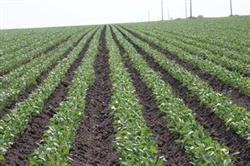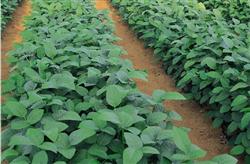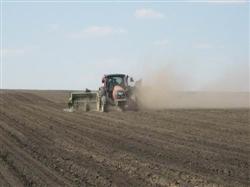High-yield and High-efficiency cultivation Model and matching techniques of Maize intercropping Sweet Potato among Spring Soybean

The main results are as follows: 1. According to local conditions, Ningyuan County belongs to subtropical monsoon humid area. due to the influence of topography and geomorphology, the vertical difference is obvious, and the dry soil is mostly distributed in mountainous areas with less light. From March to April, it was cloudy and rainy, and the cold wave was frequent, which was disadvantageous to the emergence of soybeans (4556, 6.00, 0.13%) and corn (2345, 9.00, 0.38); the drought occurred suddenly in summer and autumn, and the dry soil basically had no irrigation conditions, which was disadvantageous to the heading, silking and filling of corn; especially, the autumn drought had a great effect on the root expansion of sweet potato tubers. Therefore, corn and soybean should choose varieties with moderate growth period, high yield, drought tolerance and stress resistance, and sweet potato varieties with drought tolerance, high yield and high starch content. At present, corn varieties can choose Denghai 9, Nongda 108, Denghai 11, Jundan 20, etc., spring soybeans can choose Xiangchundou 19, Xingnong 2, Cuifan, Guizaodou 1 and other varieties. Sweet potato can choose Xiangshu 15, Xiangshu 16, Yushu 868, Xiangchang 1, Nanshu 88 and other varieties. 2. Fine soil preparation, adequate basic fertilizer corn, soybean and sweet potato are all dryland crops, coupled with the concentrated rainfall in spring and summer in our county, poor drainage is easy to cause waterlogging damage, rotten seeds and lack of seedlings. In particular, soybean requires smooth drainage in the field, suitable soil water content, too dry is not conducive to emergence, too wet and cause rotten seeds and yellow leaves; it also requires loose soil, which is conducive to soybean cotyledon unearthed and rhizobium activity. In recent years, the emergence of soybean seedlings in many places, the whole seedling is not good, mainly extensive cultivation, temporary ploughing, planting while ploughing, wet ploughing and wet seed. Therefore, we must do early ploughing, preferably deep ploughing before winter, let the soil dry and freeze, and open drains in low-lying land. Shallow ploughing once before sowing, open the box according to 2.5m, the width of the box is 2.1m, the width of the box is 0.4m, and apply sufficient base fertilizer according to the standard of 15 tons of farm manure, 150 kg of urea and 600 kg of phosphate fertilizer (preferably calcium, magnesium and phosphorus) per hectare. 3. Timely sowing and standardized planting in order to achieve high yield in the whole year, timely early sowing of corn and soybean in the first season is very important. the principle is to make full use of local temperature and climate resources to achieve high yield in two crops. it is also necessary to guard against the harm of low temperature and cold wave in early spring to the emergence and whole seedling of corn and soybean and the contradiction that the symbiotic period of sweet potato with soybean and corn is too long or too late. According to the climatic characteristics of our county, the best sowing time for soybean and corn is in mid-late March. Corn and soybean should be sown at the same time before and after the Spring Equinox in spring according to sunny days. Sweet potato is interplanted in the reserved row of soybean from late May to early June. The symbiotic period of sweet potato, soybean and corn is about 40 days. Corn is a long-stalk crop, so intercropping with soybean and sweet potato must standardize the cultivation specifications, and give full play to the yield-increasing ability of each crop, especially the corn planting population should not be too large to affect the growth of soybean and sweet potato, nor too thin to affect the yield-increasing potential of corn. The specific methods are as follows: the east-west direction is 2.5m, the width of the box is 2.1m, the width of the box is 0.4m, one row of corn is planted on one side of the box, the distance between corn plants is 20cm, and three corn seeds are sown in each hole to keep double seedlings, which ensures that the corn is about 37500 plants per hectare. Sowing soybean in wide and narrow rows, sowing 7 rows of soybeans per box, row width 30cm of soybeans close to corn, general row spacing 33cm between soybeans, plant spacing 20cm, according to the characteristics of different soybean varieties, sowing soybean seeds per hectare, sowing 4 soybean seeds, ensuring that the number of seedlings per hectare is about 360000. Sweet potato was interplanted in the reserved row of soybean and between soybean and corn according to the plant row spacing of 33cm × 40cm 40 days before corn and soybean harvest. 4. Improving sowing quality and ensuring one sowing whole seedling and one sowing whole seedling is the basis of high and stable yield, especially the good uniformity of corn can avoid the phenomenon of large seedlings bullying small seedlings, strong seedlings bullying weak seedlings and uneven yield of plants. In order to ensure a whole seedling sowing, we should select seeds before sowing, remove broken, rotten and moldy seeds, ensure the use of standard seeds with a germination rate of more than 85%, and at the same time do rodent control work to reduce rodent damage; sowing soybean and corn with 750 kilograms of phosphate fertilizer per hectare mixed with 15 tons of high-quality fire soil ash cover seed, avoid direct contact with chemical fertilizer when sowing, spring sowing should be shallow, cover ash should not be too thick, sowing soil is dry, in order to facilitate seed germination. 5. Strengthen management to ensure a bumper harvest (1) after checking and replenishing seedlings, evenly growing soybean and corn seedlings, if a lack of seedlings is found, the seeds should be replanted in time: the replanted seeds can be soaked in water for about 3 hours, and should be replanted with water in case of drought, in order to ensure the emergence of seedlings on time, it is best to use pre-bred prepared seedlings for transplanting, or to reserve a seedbed at the edge of the field and corner according to the 10% lack of seedlings in the planting area of soybean and corn. The method of sowing in the field and raising seedlings in the seedling bed at the same time is convenient, simple and feasible. Sweet potato should be checked and replenished within 5 days after sowing. According to investigation, some farmers have adopted the means of increasing sowing quantity in order to ensure the whole seedlings of corn and soybeans, resulting in the phenomenon of excessive number of seedlings per plant or even clustered. The excess seedlings must be evenly distributed between seedlings, maize seedlings during the period of 3 leaves after emergence, and soybean seedlings in the cotyledons to true leaves after emergence, the distance between seedlings is about 3cm, and 3 seedlings are suitable for each seedling. (2) ploughing in the middle to cultivate the soil, skillfully applying topdressing to corn and soybean should be carried out three times after emergence, especially in the seedling stage, the growth of soybean is slow and weeds are easy to breed, so it should be ploughed, loosened and weeded many times in time to promote the development of root groups. and refreshing water can store water. Corn combines shallow ploughing with soil cultivation before spike after pulling grass to prevent lodging; soybeans are combined with ploughing before flowering to cultivate soil; sweet potatoes should dig up the soil of corn and soybean immediately after corn and soybean harvest, and at the same time use about 15 tons of fence fertilizer per hectare as base fertilizer, combined with ploughing and soil cultivation, ditching and ridging. Topdressing pays attention to "skillful application" and "suitable application". After the emergence of maize seedlings, combined with the topdressing of 1500-2250 kg of manure water per hectare as seedling fertilizer, heavy application of ear fertilizer, mainly nitrogen fertilizer. Soybean should apply seedling fertilizer and flower and pod fertilizer early, and completely change the practice of "soybean can fix nitrogen and do not need nitrogen fertilizer". At present, the yield of the improved soybean varieties popularized, such as Xingnong 2, Cuifan soybean and Xiangchundou 19, is much higher than that of farm varieties, and its need for nitrogen fertilizer is much higher, so it is necessary to supplement nitrogen in time in order to obtain high yield. The practice is to apply 75-112.5 kg urea per hectare when soybean rhizobium has not yet been formed, and to apply a little more soil with poor soil fertility; to apply flower and pod fertilizer in time 7 days before flowering, 112.5-150kg ternary compound fertilizer per hectare, and attach importance to the application of micro-fertilizer, combined with plant hormones, foliar spraying paclobutrazol and potassium dihydrogen phosphate to reduce falling flowers and pods and increase the pod setting rate per plant. The topdressing of sweet potato is carried out in the later stage, generally spraying twice with potassium dihydrogen phosphate, and the poor growth can add 1-2% urea solution, which has the advantages of low cost, easy operation and good effect. (3) timely control of diseases and pests in corn, focusing on the control of one pest and one disease, namely corn borer and sheath blight. When corn is in the trumpet stage and 5-10% of the plants have small spots on the heart leaves, fipronil or carbofuran pesticides can be mixed with fine soil snacks to control the damage of corn borer. When 15% of the corn plants had sheath blight, Jinggangmycin was used to control it, and it was controlled again every 10 days or so. Soybean is vulnerable to bean pod borer and soybean heart borer 3-5 days after flowering, so it should be controlled in time. Generally use 40% dimethoate 100 grams with water 60 kg or 90% crystal trichlorfon 800 times spray, 2-3 times in a row, each time at intervals of 5-7 days. For aphids, omethoate can be used to control aphids. (4) protect the stems and leaves, assist the pollination corn to be planted in the working line, and be careful not to damage the stems and leaves in agricultural production. The old leaves of corn are removed in the late growth stage, which is beneficial to ventilation and light. Emasculating and artificial pollination at flowering stage of corn has a good effect on increasing yield. The operation method is as follows: when the male ear of corn is exposed 1 / 3, the male ear is pulled out, and when the ear is in full bloom, the plant is driven at 9-10:00 in the morning for artificial pollination, once every 2-3 days, 2-3 times in a row. The ploughing of sweet potato should be carried out before closing the ridge, and do not turn or lift the vine after closing the ridge, so as not to disrupt the balanced distribution of rattan leaves and damage the rattan leaves, reduce the photosynthetic efficiency, affect the expansion of potato blocks, and reduce the yield. (5) when corn ears, stems and leaves turn white when harvested at the right time, most of the leaves of soybean are dry and fall off, the pods are grass-withered, the seeds are separated from the pod wall, and the seeds are semi-dry and not hard. When the plants make a sound, they should be harvested in time to facilitate sweet potato production. There is no obvious growth termination period of sweet potato, the yield can be increased by prolonging the growth period, but the harvest should be finished before the low temperature frost injury.
- Prev

Cultivation and management skills of soybean in spring
1. Variety selection. According to the local ecological type and market demand, the varieties with suitable ripening period, high yield, high quality and strong stress resistance were selected according to local conditions, such as Xiangchundou 21, Xiangchundou 22, Xiangchundou 23 and so on. Change the seed every 3 years. 2. Seed treatment. Planting in acid soil.
- Next

Problems needing attention after sowing of spring soybean
After sowing spring soybeans, it is the spring rain season, so it is necessary to prevent excessive soil moisture and poor permeability, affecting seedling emergence and even causing rotten seeds. The practical experience is that planting spring soybean seeds in autumn and sowing in the following spring by "autumn propagation" can effectively prevent the rotten seeds after sowing and improve the germination rate and seedling emergence rate.
Related
- The first cup of black tea in spring, the flavor and history of tea gardens in Kenya, Africa
- The computer can not only choose potatoes, but also grow tea rice. AI will grow winter oolong tea champion.
- It is not only the inflated tea bitten by insects, but also engraved with the four seasons tea in Beipu.
- The Oriental Beauty Tea Festival in Zhuxian County takes the stage at the weekend to experience the plus-size feast of oil tea.
- & quot; Oriental Beauty Tea & Exploration of Emei in Hsinchu, the hometown of quot;
- The new variety of strawberry "Tainong 1" dessert is the first choice with mellow aroma. Crimson gorgeous
- History of Tea in Taiwan: from Wild Inner Mountain to Export Tea Garden
- Two types of Taiwan Oriental Beauty Black Tea won the British three-Star Award for Childhood Tea Xiang Zhang Jiaqi changed from pilot to champion tea maker.
- Banana species and varieties: the planting history of Taiwan Xianren banana and dwarf banana is long, is banana disease resistant?
- Coffee planting Technology: Qianjie Coffee from Seedling to harvesting

